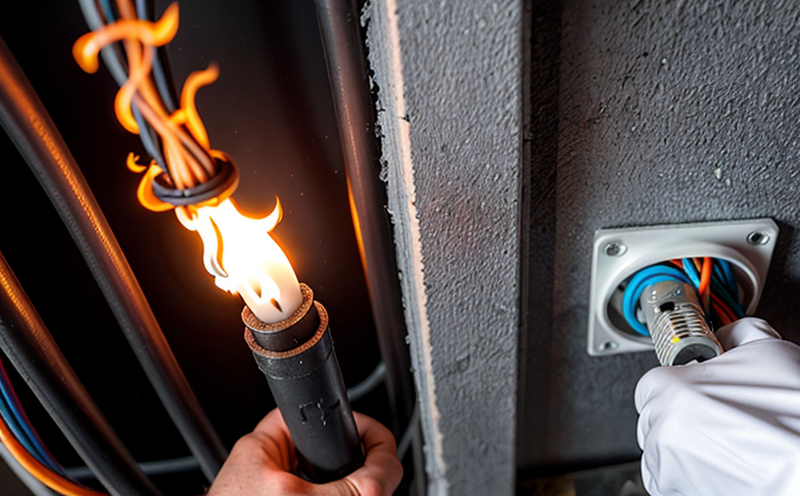Fire Resistance Testing of Marine Cables
The fire resistance testing of marine cables is a critical service that ensures the integrity and safety of electrical systems on ships, yachts, and other maritime vessels. This testing verifies that cables can withstand exposure to fire without compromising the vessel's structural or operational safety. Marine environments present unique challenges due to the presence of saltwater, high humidity, and stringent operational requirements. These factors necessitate specialized test methods tailored to meet the specific demands of marine applications.
The primary focus of this testing is to ensure that cables maintain their insulating properties under extreme conditions, preventing fires from spreading and causing catastrophic failures. The tests are conducted in controlled environments where the cables are subjected to intense heat and flame for a specified duration. The results of these tests provide assurance that the cables can operate safely even if exposed to fire hazards during operations at sea.
Marine cables come in various types, including power distribution cables, control cables, and communication cables. Each type has its unique characteristics and applications on board ships. For instance, power distribution cables are used for transmitting electrical energy from the ship's generators or shore power sources to various electrical equipment. Control cables are essential for monitoring and controlling machinery and systems aboard the vessel. Communication cables ensure reliable data transmission between different parts of the ship.
The fire resistance testing process involves several stages. The first step is to select appropriate specimens that represent the types of cables used in marine applications. These specimens undergo rigorous preparation, including cleaning, drying, and marking them for identification during testing. Once prepared, the cables are placed into a furnace or other suitable apparatus designed to simulate real-world fire conditions.
The test parameters vary depending on the type of cable being tested but generally include temperature levels ranging from 500°C up to 950°C, exposure times that range from several minutes to hours, and flame types such as natural gas flames or diesel fuel oil flames. The specimens are continuously monitored using specialized instrumentation capable of measuring changes in insulation resistance, heat flow, smoke production, and other critical parameters.
After the test concludes, detailed reports are generated summarizing the results observed during testing. These reports provide comprehensive information regarding the performance of each cable under fire exposure conditions. Key data points include whether or not the insulation integrity was maintained throughout the test duration, any changes in electrical characteristics, and the amount of smoke produced by the cable.
Fire resistance testing is governed by international standards such as IEC 60332-1, which specifies various classes based on performance criteria. Compliance with these standards ensures that marine cables meet global quality benchmarks required for safe navigation across different regions worldwide.
- IEC 60332-1: Classification of flexible cords and flexibles for general use – Part 1: Tests for basic flame retardant properties
- EN 50268: Specifications for power cables intended for installation on ships
- ASTM G177: Standard test method for flammability of solid materials using a cone calorimeter
In summary, fire resistance testing of marine cables plays an indispensable role in safeguarding lives and assets aboard vessels. By adhering to stringent testing protocols and meeting relevant international standards, manufacturers can produce reliable products that contribute significantly towards enhancing maritime safety.
Benefits
Performing fire resistance testing on marine cables offers numerous benefits beyond mere compliance with regulations:
- Promotes Safety: Ensures that electrical systems remain functional during emergencies, thereby protecting crew and passengers from potential hazards.
- Enhances Reliability: Reduces the likelihood of unplanned shutdowns due to failures caused by fire exposure.
- Meets Regulatory Requirements: Demonstrates adherence to international standards like IEC 60332-1, ensuring smooth passage through certification processes.
- Improves Brand Reputation: Establishes trust among clients and stakeholders regarding product quality and reliability.
- Supports Innovation: Encourages continuous improvement in cable design and manufacturing techniques to meet ever-evolving demands.
The benefits extend beyond the immediate safety of the vessel; they also contribute positively to environmental sustainability by preventing oil spills resulting from damaged cables during fires.
Eurolab Advantages
Eurolab stands out as a premier provider of fire resistance testing services for marine cables, offering several advantages that set us apart:
- Comprehensive Testing Capabilities: Our state-of-the-art facilities allow us to conduct tests according to all relevant international standards.
- Experienced Professionals: Our team comprises highly skilled engineers and technicians with extensive experience in marine cable testing.
- Customized Solutions: We tailor our services to meet the specific needs of each client, ensuring that every test is conducted precisely as required by individual specifications.
- Fast Turnaround Times: Leveraging advanced technology and efficient workflows, we deliver timely results without compromising on quality.
- Global Recognition: Our certifications are widely accepted across different regions, facilitating seamless market entry for clients worldwide.
By choosing Eurolab for your fire resistance testing needs, you gain access to a wealth of expertise and resources that contribute significantly towards achieving your business objectives.
International Acceptance and Recognition
The fire resistance testing conducted at Eurolab is recognized globally due to its adherence to strict international standards:
- IEC 60332-1: This standard classifies flexible cords and flexibles for general use into different classes based on their flame retardant properties. Compliance with this standard ensures that marine cables can withstand fire hazards effectively.
- EN 50268: Specific to power cables intended for installation on ships, this European standard sets out detailed requirements regarding design and construction to ensure safe operation under various conditions.
- ASTM G177: Used worldwide for evaluating the flammability of solid materials using a cone calorimeter, this American Society for Testing and Materials standard provides valuable data for assessing fire resistance performance.
The recognition gained from meeting these standards opens doors to international markets where stringent safety requirements apply. Vessels equipped with certified cables can navigate diverse regulatory landscapes confidently.





